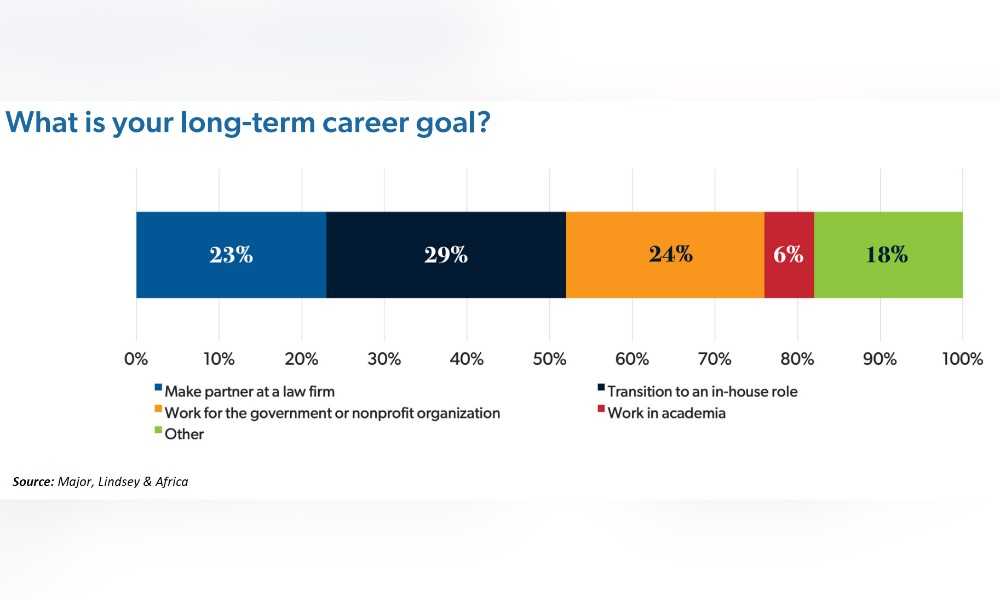The traditional partnership track is not what it used to be

Law firms are evolving to address a generational shift in career expectations and incentive systems, industry analysts reveal. Notable efforts include the designing of alternative career paths to partnership which achieve better work-life balance – an increasingly important offering to young lawyers – without sacrificing career advancement opportunities.
US BigLaw firm Weil, Gotshal and Manges was one of the first firms to slash its nonequity partner track by two years – from a 9.5-year trajectory to a 7.5-year trajectory – a decision mirrored by Kirkland & Ellis at the end of 2021 when it announced that it was abridging its equity partner track from 10 years to nine.
The past few years also saw Am Law 200 firm Honigman creating a “professional attorney track” distinct from its partnership path. The track aimed to provide lawyers opportunities for career advancement, skills development, and firm involvement with no business development obligations and “without the partnership-track pressures”. CEO David Foltyn reported that as of 2022, around 20 of its lawyers had pursued this alternative career path and were improving the firm’s value to clients through their growing expertise in fields such as AI and technology, which in turn improved Honigman’s offerings on specialised services such as due diligence and leasing.
“We’re building up another whole group to build up leverage and offer better pricing at better rates for us,” Foltyn was quoted as saying.
Just last year, Lathrop GPM, another Am Law 200 firm, established separate partner tracks that gave associates the option of billing 1,600 hours or 1,900 hours per year. While the pay was less for billing fewer hours, the partnership, client, and professional development opportunities were identical.
“We do think people are looking for more flexibility, and it’s not one-size-fits-all these days, so we want to be a little bit more bespoke and give people different paths and opportunities to succeeding here,” managing partner R. Cameron Garrison told The American Lawyer.
Garrison observed that some associates were purely motivated by “[working] really hard and [billing] a lot of hours”, while other, equally talented associates were just not as interested in working that many hours.
“But they’re still really valuable to our team and our clients, and we don’t want to lose those associates just because they’re not interested in billing 1,900 hours a year,” he said. “We created those tracks and allow associates to opt in based on where they are in their journey, so that’s something we’re pretty proud of….”
These moves echoed the results of a survey conducted by legal executive search firm Major, Lindsey & Africa and published just last month. The survey saw a 20% drop in the number of gen Z law students who wanted to work in BigLaw after graduation from 59% in 2020 to just 39% in 2023. Gen Z lawyers already working as associates or clerks also showed a waning interest in every size of law firm, whether big, midsized, or boutique.
Major, Lindsey & Africa defined gen Z lawyers as those born from 1995 to 2012.
Long-term career goals among the newest generation of lawyers and law students also revealed a shift away from what the report called “traditional law firm paths”. Making partner at a law firm was now a less popular goal (23%) than transitioning to an in-house role (29%) or working for the government or a nonprofit organisation (24%). Just as many were working towards academia or some other career objective.

Major, Lindsey & Africa said this slump in demand in law firm partnership reflected the current issue of high attrition among law firms.
“There are perceptions among gen-Z respondents that in-house opportunities and government positions offer a better work-life balance than do law firms,” the report said. “Gen-Zers are highly motivated to achieve work-life balance, so their answers are not surprising. We also see altruism and the pursuit of meaningful work as a strong motivator for gen-Z’s desire to work in the nonprofit sector or government long term.”
More than half of the respondents (58%) felt reduced working hours and part-time policies in place were the best mental health initiative a law firm could have, while a quarter (25%) admitted that “high hours and working nights/weekends” were reason enough for them to leave their firm.
Asked what would make them stay at a BigLaw firm, however, opportunities for advancement and highest market salary were the top two answers.
“It shows you there’s a large portion of individuals who want a little bit of an alternative track that’s available so they can stay at a platform, do prestigious work, [and] maintain a high salary, but at the same time not pay the cost of burnout,” survey co-author Jacqueline Bokser LeFebvre was quoted as saying in The American Lawyer.
LeFebvre said “expanding the pie” and offering alternative career paths would help keep talent within BigLaw for a longer period of time. “[This] generation is financially motivated – but not at the expense of their health and ability to have a life outside of work,” she said.










